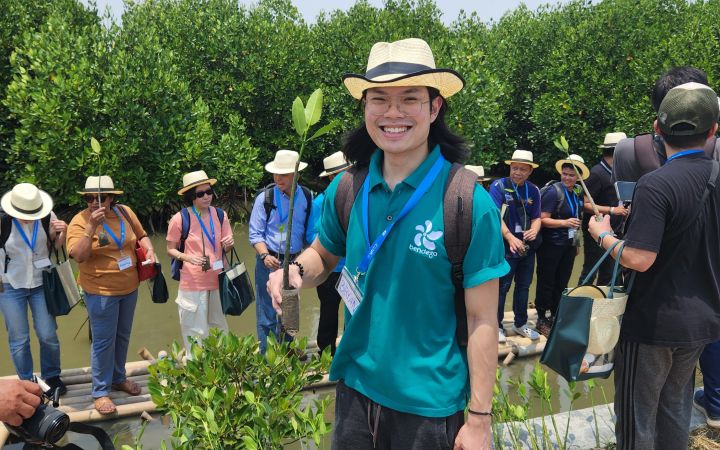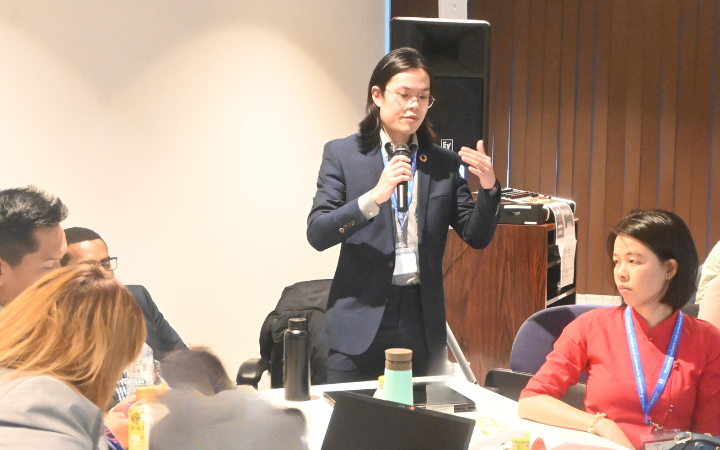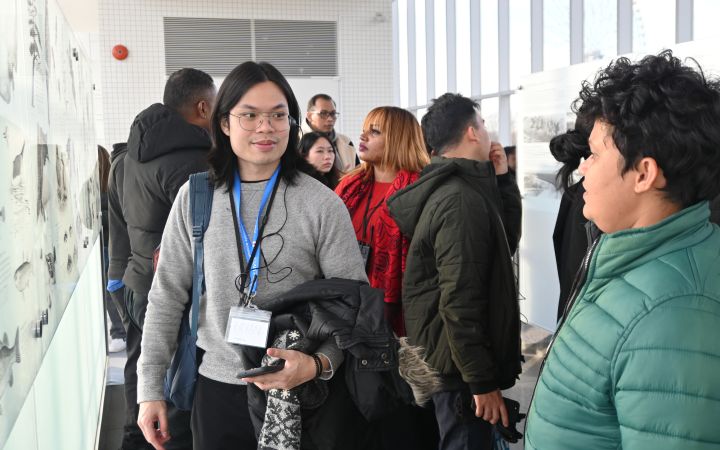- Young environmentalist Bryan Sinatra is CEO of a Bali-based NGO dedicated to mangrove restoration and protection.
- He completed the 2024 UNITAR Leaders for a Free and Open Indo-Pacific: Sea and Human Security training programme, successfully advancing to its final phase.
- Bryan is applying what he learned to enhance the value of his organization’s mangrove-based products. He aims to make them more marketable while raising public awareness about the vital role of mangroves in environmental sustainability.
- Bryan is eager to adopt a holistic approach that integrates mangrove conservation with the broader coastal ecosystem.
26 March 2024 Hiroshima, Japan – Indonesia is renowned for its breathtaking natural beauty, but it is also highly disaster-prone and faces environmental challenges. Determined to make a meaningful change, young environmentalist Bryan Sinatra joined the UNITAR Leaders for a Free and Open Indo-Pacific: Sea and Human Security training programme.
From Coral Enthusiast to Environmentalist
Bryan has always been passionate about the environment. His interest began with collecting corals, which sparked his determination to protect coastal livelihoods. Following his passion, in 2023, Bryan became the CEO of a Bali-based nonprofit NGO dedicated to mangrove restoration and protection. His organization empowers local fisherfolk, using technology and community collaboration to promote sustainable mangrove products and ecotourism.
When Bryan saw the call for applications for the Leaders for a Free and Open Indo-Pacific: Sea and Human Security training programme, he quickly recognized its alignment with his personal passion and professional mission. He applied and began the programme in June 2024.
UNITAR Programme: Inspired by Local Mangrove initiative
The UNITAR programme, supported by the Government and People of Japan, aimed to provide agents of change from Asian and Pacific Island countries with the skills, knowledge and capacity to enhance climate, environmental, economic, food and maritime security. It also sought to establish a coordination mechanism across the Indo-Pacific. It began with an online phase, in which over 900 participants learned about blue economy, ocean governance, maritime, environment, climate and food security.
Bryan’s exceptional performance earned him a spot in the second phase of the programme: the regional workshop in Jakarta in September 2024. Around 80 participants from 12 Asian countries joined the workshop, where they engaged in expert-led lectures, group work and mentoring sessions.
One of the highlights was a study tour in Tangerang, where the participants visited the Urban Aquaculture Site. There, Bryan observed how the local community promoted tourism through mangrove-based products. What he saw inspired him. Bryan and his NGO team brainstormed extensively before developing mangrove-based baked goods. Beyond being a healthy and appealing product, these treats serve as a powerful tool to raise public awareness about the vital role of mangroves in environmental protection.
By creating economic incentives, we encourage communities to protect mangroves and recognize their benefits. With that realization, we can inspire conservation efforts and promote ecotourism. —Bryan Sinatra, environmentalist and UNITAR alumnus, Indonesia
Satoumi: a Holistic Approach to Coastal Conservation
The practical solutions Bryan developed at the Jakarta workshop won him a place in the final phase of the programme – an intensive two-week in-person workshop in Japan in February 2025. There, he continued his learning with fellow leaders from across the Indo-Pacific region.
Bryan particularly enjoyed connecting with participants from Pacific nations. He was fascinated to discover that several shared his passion for mangrove conservation, which broadened his perspective on how mangroves are used and marketed in different regions of the world.
A key takeaway from the Japan workshop for Bryan was the concept of satoumi (里海), which reflects how marine and coastal resources are shaped and sustained through long-term interactions between humans and ecosystems. This concept deeply resonated with Bryan, leading him to a critical realization: mangrove restoration must be approached holistically, in connection with the broader coastal ecosystem.
I used to focus solely on mangroves, but now I understand that reefs and seagrass are all interconnected. To achieve true sustainability, we must consider the entire coastal ecosystem as one. —Bryan Sinatra, environmentalist and UNITAR alumnus, Indonesia
Future Focus: Connecting Mangrove Conservation with Food Security
Looking ahead, Bryan is eager to apply the knowledge and insights gained from the eight-month training programme to further his mission of mangrove restoration and protection. He envisions his organization playing a pivotal role in shaping Indonesian society and fostering greater awareness of food security and environmental sustainability. As part of this vision, Bryan plans to diversify his organization’s mangrove-based products, not only to promote biodiversity but also to emphasize the connection between environmental conservation and sustainable food systems.
Bryan calls upon the younger generation to take small but meaningful steps towards change. He believes that collective small actions can lead to a greater positive impact on society.
You got to just take a step forward and make a small, incremental change. And in the bigger picture, you would be able to change the society … in a better way. —Bryan Sinatra, environmentalist and UNITAR alumnus, Indonesia
About UNITAR
The United Nations Institute for Training and Research (UNITAR) is a dedicated training arm of the United Nations. In 2023, UNITAR trained approximately 540,000 learners around the world to support their actions for a better future. UNITAR has a global presence, with offices in Geneva, Hiroshima, New York and Bonn and networks around the world. Find out more at www.unitar.org




